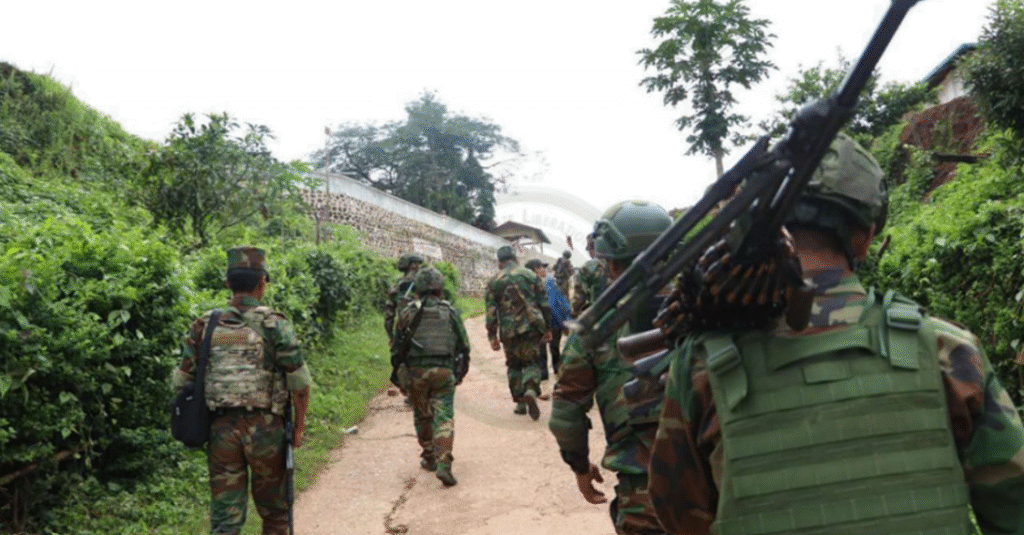“Myanmar Spring Chronicle – May 2 Overview”,
published by MoeMaKa on May 3, 2025*:
Global Power Struggles and the Face of Modern Colonialism
On April 28 and 29, the Ta’ang National Liberation Army (TNLA) and Myanmar’s military junta held talks in Kunming, China, under Chinese mediation. TNLA, one of the three members of the Northern Brotherhood Alliance, reportedly attended the negotiations not by choice, but under pressure from Beijing.
China, a neighboring power with strong influence over both the Myanmar junta and ethnic armed groups along its border, continues to act as a dominant force in the region. The junta also heavily relies on China for trade, weapons, and diplomatic shielding on the international stage.
Just before these talks, MNDAA (Kokang Army)—a key actor in Operation 1027—returned control of Lashio to the junta through a negotiated settlement, marking a significant shift in the objectives of that campaign. Now TNLA, too, finds itself in dialogue with the junta—again, due to Chinese pressure.
Where the Talks Stand
TNLA has announced that no agreements were reached in this initial round.
The junta reportedly demanded that TNLA withdraw from a broad stretch of territory—from Naungcho, Kyaukme, Hsipaw, Mogok, all the way to Namhsan and Mantong. TNLA rejected this demand. Both sides agreed to meet again in August.
According to TNLA, Chinese special envoy Deng Xijun facilitated the meetings and proposed a full ceasefire, including:
-
Halting airstrikes, heavy shelling, and drone attacks
-
Reopening China-Myanmar trade routes
-
Establishing broader stability
-
Replicating the MNDAA-style ceasefire framework
China’s True Intentions
China’s primary concern is protecting its trade routes and investments in Myanmar. This drives its push for ceasefires—not humanitarian reasons. To ensure this, Beijing seems to prefer working with the junta—the actor it deems most capable of guaranteeing compliance—while viewing the Northern Brotherhood as negotiable but secondary.
What’s unfolding is part of a wider geopolitical trend. Across Asia, Africa, and Latin America, China is deepening its economic and political footprint. Developing nations are increasingly subject to Chinese influence via infrastructure investments, loans, and resource extraction deals.
While many developing countries—including Myanmar—traditionally referred to Western powers as modern colonialists, China’s growing economic entrenchment now draws similar criticism.
The U.S. Retreats Into Self-Interest
Under President Donald Trump, U.S. foreign policy is overtly transactional and interest-driven. Human rights, democracy, and freedom of expression—once loudly championed—are now taking a backseat.
In Trump’s own words, the U.S. won’t aid Ukraine militarily unless Ukraine agrees to business deals—including mineral extraction contracts and energy development licenses. After this statement, reports emerged that Ukrainian President Zelenskyy agreed to certain terms.
What This Means for Myanmar
The Spring Revolution in Myanmar, like Ukraine’s war for survival, now finds itself in a global landscape where great powers put their interests first.
China backs the junta for stability and economic access. The U.S., under Trump, is retreating from its traditional pro-democracy role, offering support only if there’s a profit to be made.
As a result:
-
Myanmar’s revolutionary hopes are undermined by China’s pressure
-
The U.S. increasingly ignores Myanmar’s struggle, focusing instead on financial gains elsewhere
In this era of modern colonialism—driven by trade, minerals, and geopolitical competition—neither side is backing the people’s aspirations in Myanmar. The Spring Revolution continues, but international support is growing colder and more conditional.

